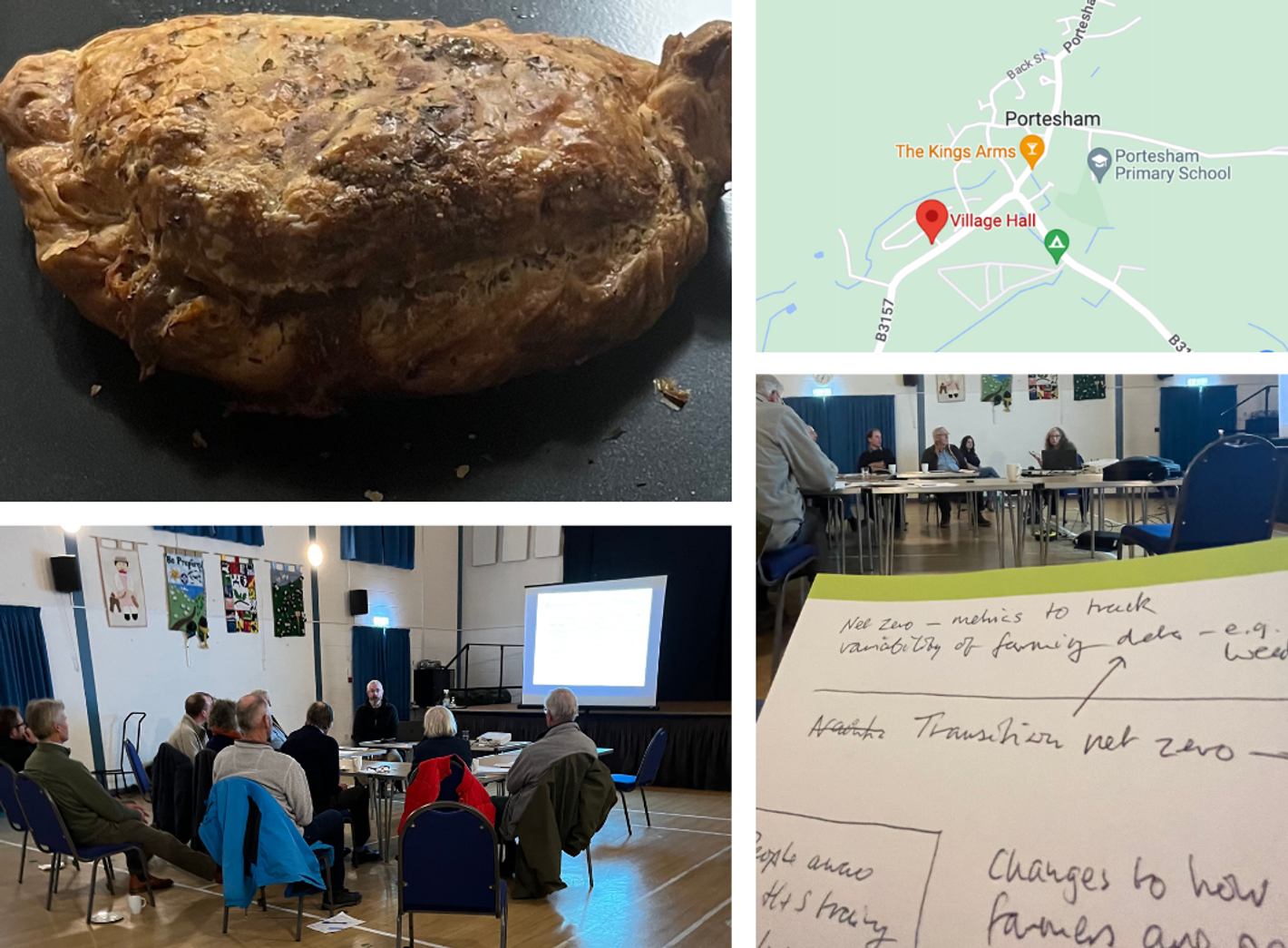Future Skills in Dorset: Uncovering Qualitative Insights for Tomorrow’s Success.
On a dark and wintery evening In late January 2023, the research team traveled to Portesham Village Hall in rural Dorset.
On their way to a farmers’ workshop, they almost got lost in thick fog.
The workshop was run by the Farming and Wildlife Advisory Group (FWAG), an organisation that supports farmers.
The workshop’s purpose: explain how the UK government funds farming.
A lot has changed in the sector since Brexit. This was a chance to fact-find.
The team introduced themselves to the FWAG reps and farmers.
The evening got started with the FWAG team briefing the farmers on the changes – using anecdotes and slides.
The bits in between.
The workshop gave valuable insight into a rapidly changing sector and the skills needed to navigate and survive it.
The farmers were receptive and engaged, asking questions and raising issues.
In between slides, there were breaks where tea was sipped, and pasties were eaten. A chance for the research team to speak with farmers.
The farmers were friendly, open, and candid.
One farmer was new to the sector and used to be an accountant. Another had been in farming for over 50 years and was sanguine about the changes afoot.
One farmer advised:
“if you wanted to understand modern farming then watch an episode of ‘Clarkson’s Farm”
The team was slowly absorbing the information. Making notes and asking questions.
But what exactly was The Study team doing there?
This was the start of the Local Skills Improvement Plan (LSIP) research.
A research project that would last for over 6 months.
It would see The Study partner with the Dorset Chamber of Commerce.
The mission: to discover the skills needs of employers in the county.
“Agriculture is just one of the sectors to be focused on.”
👉 What are LSIPs?
LSIPs are the UK government’s Local Skills and improvement Plans designed to close skills gaps by aligning education and training with local demand. Funded by the Dept for Education, 38 LSIPs run around the UK, reflecting the unique skills needs of each area.
Researching skills from the ground up
The LSIP is a new approach that prioritises technical skills education, centered around employers. This involves getting close to employers to understand exactly what they need.
💡 That night in Portesham set the scene for how The Study would capture real-life insights into business skills, quite literally, out in the field.
Appearances can deceive.
Behind Dorset’s picture postcard image, lies an £18+ billion economy that is strong and resilient. Approximately 52,000 businesses are based in Dorset.
Dorset businesses have low churn and high survival rates. ****
Some surprising statistics:
- The UK’s top area for high-growth digital businesses.
- Dorset is the second fastest-growing area for start-ups.
- It’s the third fastest-growing financial sector with a strong entrepreneurial culture.
Dorset also faces other economic challenges like an aging population and low wages.
Statistics scratch the surface.
Dorset is made up of employers who face their own individual challenges running their businesses.
Discovering what future skills employers need against the backdrop of an economic crisis is not easy.
Where do you start?
Well before we got to the village hall, we had already started research.
In December 2022, The Study team started off looking at existing data:
- Understanding the size and composition of Dorset businesses in each target sector
- Looking at the numbers of each business from target sectors in parliamentary constituencies
We then looked at existing research – AKA a ‘literature review’.

Why do a literature review?
Think of Newton’s quote:
“…standing on the shoulders of giants”
Literature reviews involve reviewing previous research. Seeing what others already know.
This helps you quickly understand existing knowledge and identifies gaps.
It enhances critical thinking and helps inspire new questions.
Just like a cake, you build layers of knowledge as you go.
Armed with the stats, we planned our own research with employers.
First, we designed a qualitative survey to help guide us on what questions we’d need to ask when we got to the interview.
We built a psychometric tool to statistically validate survey results.
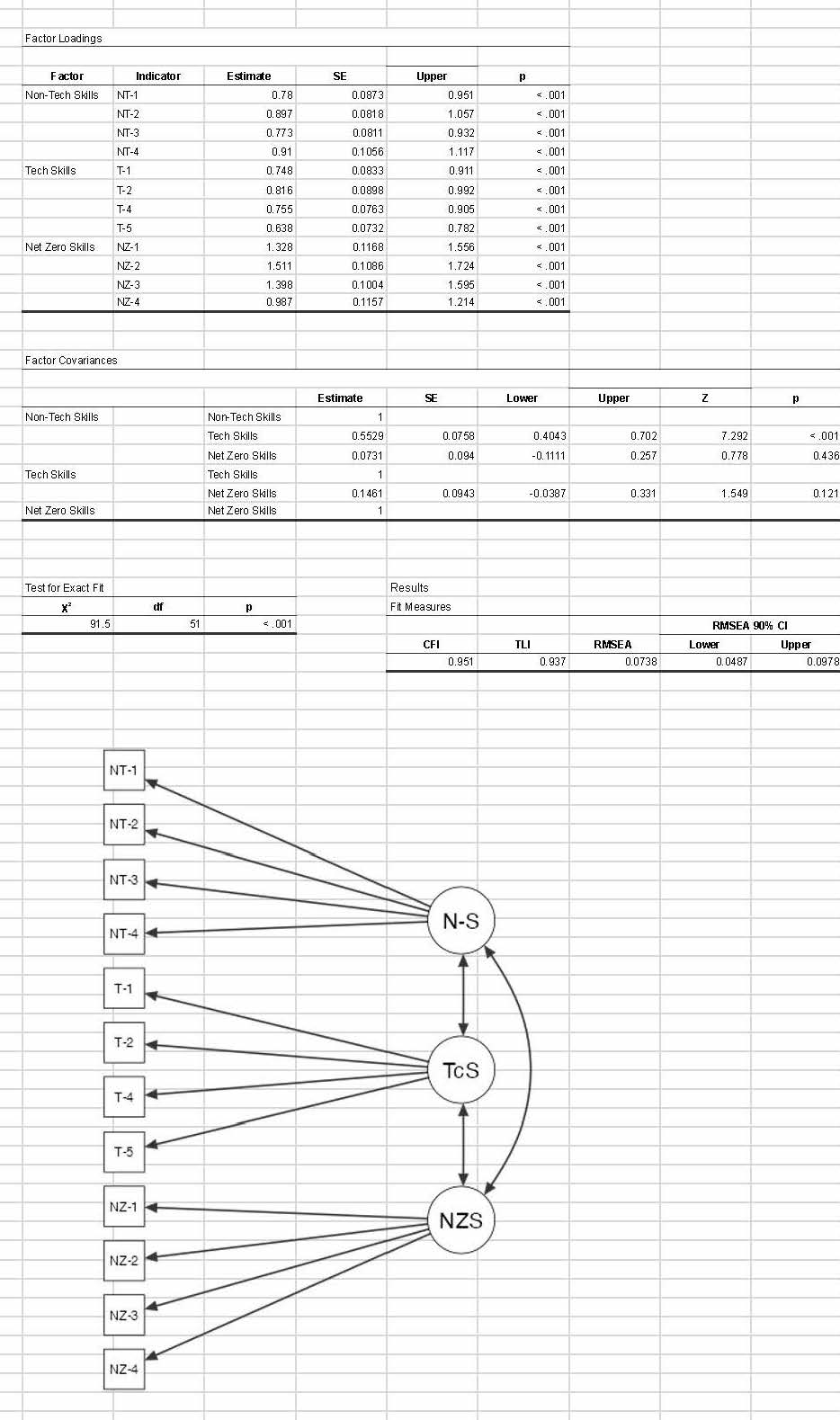
Then we ran the survey.
Once we’d built the psychometric tool, we published the survey and received 386 responses.
Respondents came directly from Dorset Chambers contacts as well as publishing the survey to a paid, pre-screened research panel.
It was a qualitative survey so the team captured a lot of data.
Who said surveys were simple?!
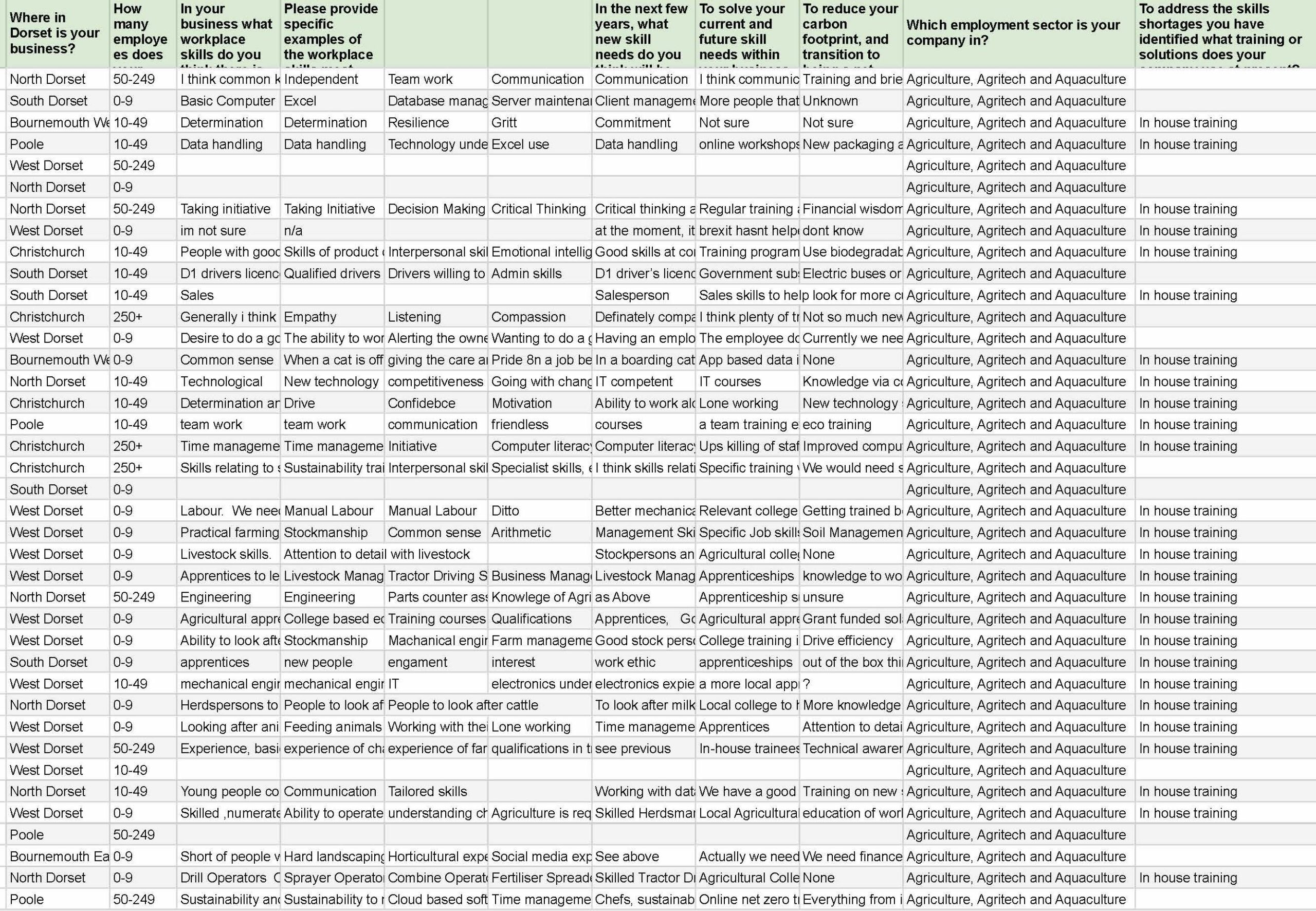
What did we learn?
If you scan the above table, you’ll see that as well as technical skills needs, like data, social media, and software, there are ‘softer’ skills mentioned.
These were
| Teamwork | Taking initiative | Common sense |
|---|---|---|
| Empathy | Communication | Critical Thinking |
Checking in with project stakeholders
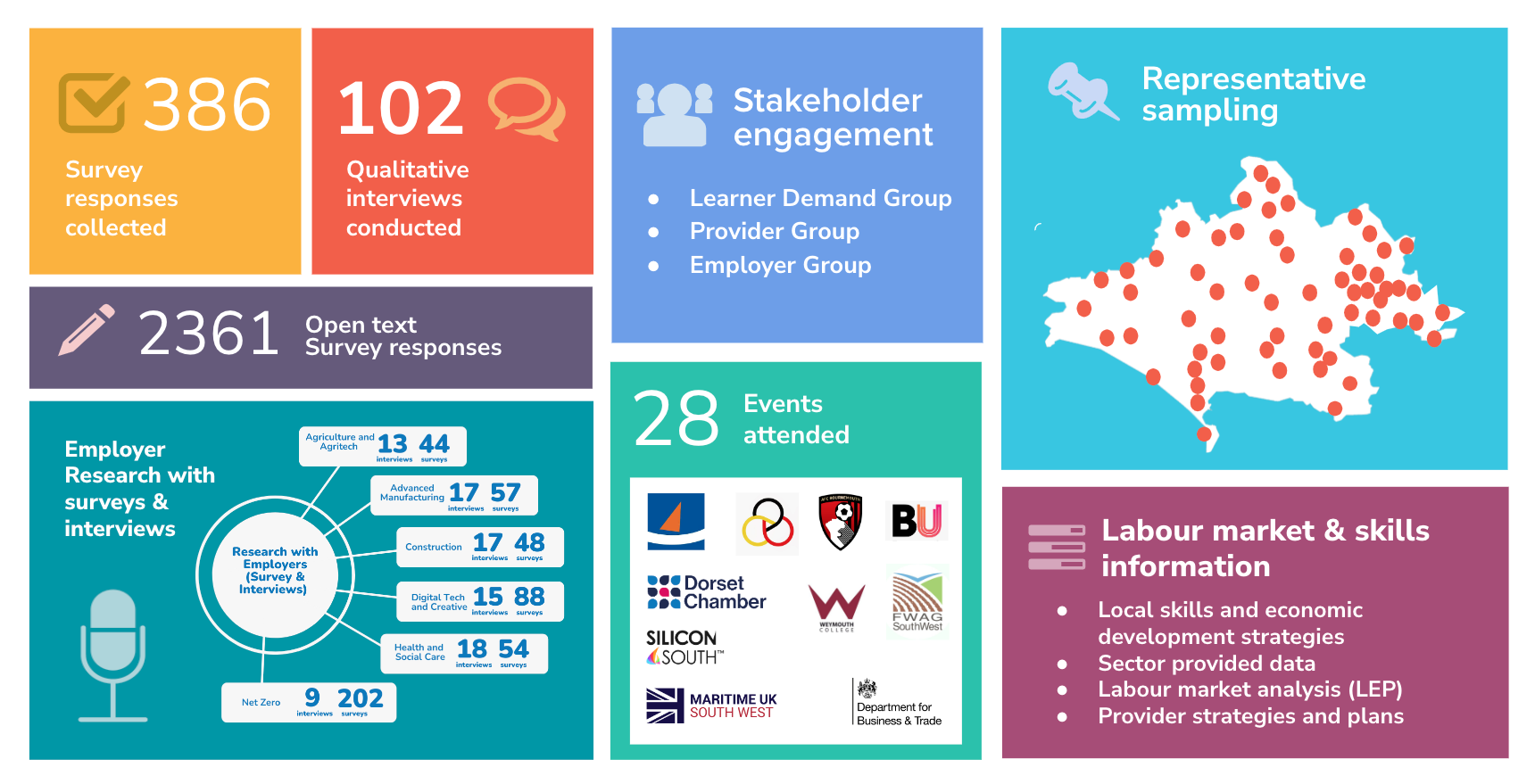
Since the project’s kick-off in December 2022, a lot has happened.
We now needed to bring all the stakeholders up to speed on where we were.
Alongside our Dorset Chamber partners, we debriefed stakeholders with interim findings in February 2023 at Merley House in Dorset.
These stakeholders included:
- Local colleges & universities
- Local council representatives
- Local Enterprise Partnership (LEP)
- Employers and representatives
In return, we needed feedback from them. Was what we’d found resonating with what they’d heard?
Were we off course or merely scraping the surface of what was there?
What stakeholders told us.
The attendees were split up into individual groups – each group facilitated by a lead whose job it was to validate or challenge the findings so far.
What we heard was concise and valuable.
By the end of the day, the feedback had both challenged and verified what we’d already heard. This gave us confidence
The Interviews.
We would recruit interview participants from 5 pre-agreed sectors identified as important to the county:
- Agriculture, Agri-tech, and Aquaculture
- Advanced Manufacturing and Engineering
- Construction
- Digital Tech and Creative
- Health and Social Care
Lining up people to talk to.
Dorset Chamber referred their members and community for interview.
The Study teams went to Chamber events to speak to employers and stakeholders. Getting support from local colleges, universities, and council members.
A real team effort.
Our target was 75 interviews (we ended up doing over 100).
Employers in some sectors were harder to reach than others.
So for the research team, this meant a lot of good old-fashioned door-knocking. Visiting trading estates and asking for referrals through personal networks.
The process was a mix of cold sales calling and investigative journalism.

Where the real work starts.
As soon as the interviews were recorded, they’d go into the team for analysis. The process looked like this:
| ⏺️ Interview recorded > | 📄 Interview Transcribed > | 📝 Interview Coded > | 🔬 Interview Analysed > | 🔁 Insights fed back |
|---|---|---|---|---|
| Where consent is given, a phone app is used, and a file is exported. | This is done manually and/or using an AI tool to transcribe. Then proofed. | Each sentence is given a ‘code’ – summarising what is said. | Codes are grouped into ‘themes’ to show dominant patterns. | Interesting themes (or lack of) are reported back to the teams. |
This workflow maximises skills and keeps the timelines in check.
While the analysis is taking shape, the Interview team heads back out to recruit and interview more participants.
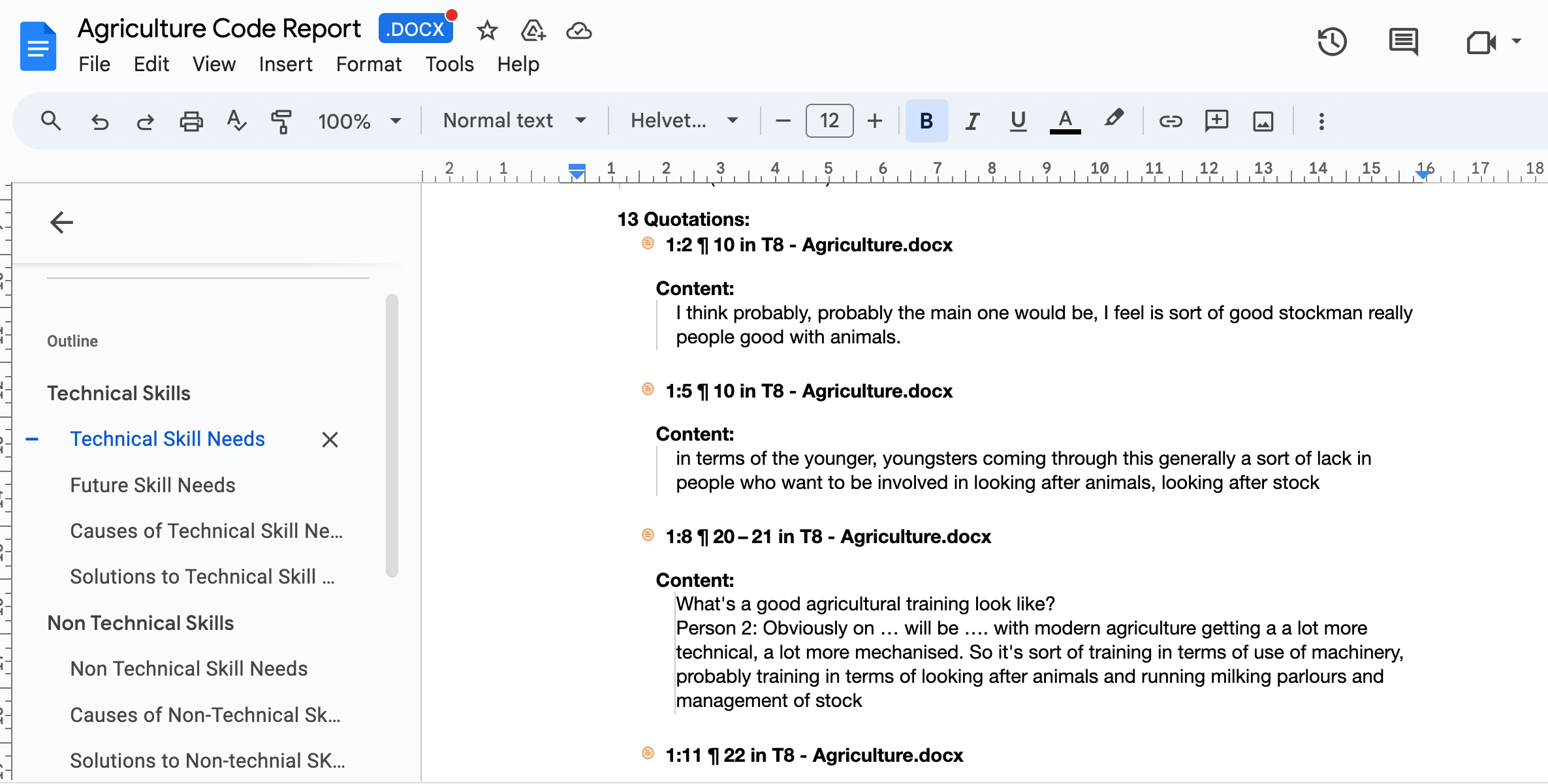
The Net Zero hunch
The initial survey touched on the transition to Net Zero and what skills employers felt they needed to make that change.
The results were not conclusive.
The team felt there was more lurking under the surface.
Although the Net Zero question was part of the overall skills survey, the decision was made to run a separate study focusing only on Net Zero skills.
Below are the survey responses suggesting people weren’t aware of the skills required to hit the 2030 target.
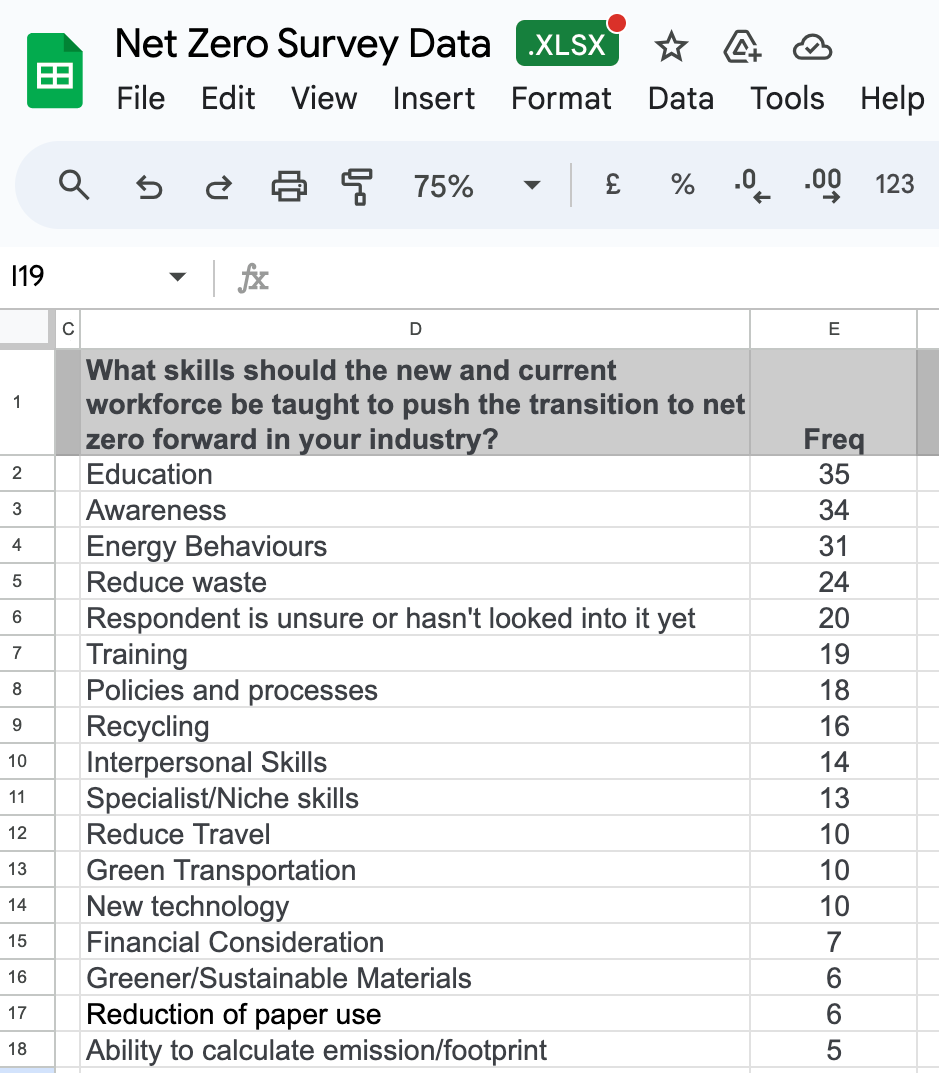
Research limitations.
Although 250 multinationals base their UK operations in Dorset. Firms like BAE Systems, Lush, and Merlin Entertainment.
Limitation #1 – Many of Dorset’s businesses are small.
The business owner might also drive the van and answer the phone.
These employers have limited time. Interviewing them meant calling or visiting out of office hours or on the weekends.
Despite interviewing over 100 people, there is a response bias at play – meaning the employers who could spare the time, responded to our research.
There are employers the research team would’ve loved to have spoken to but couldn’t.
Limitation #2 – How do you represent the views of the whole county?
You talk to as many different people in as many different places as you can. But that’s not everyone, everywhere.
The red dots below show who we spoke to and where.
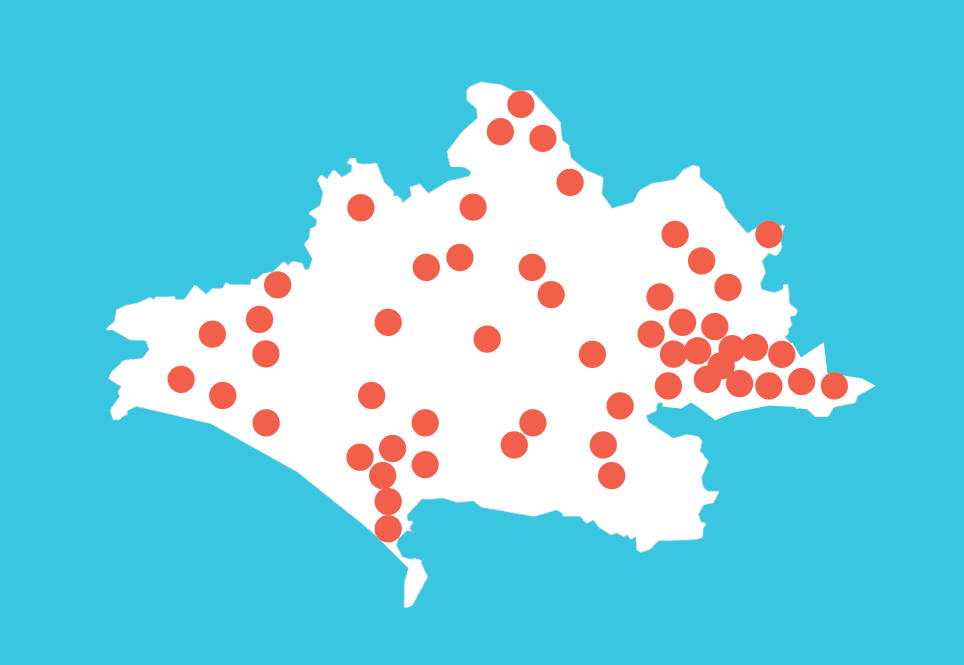
Publishing the report.
After months of research, Dorset Chamber was required to use the research findings to submit a report to the Dept. for Education.
Not an easy job. This took a lot of work – done by the team at Dorset Chamber.
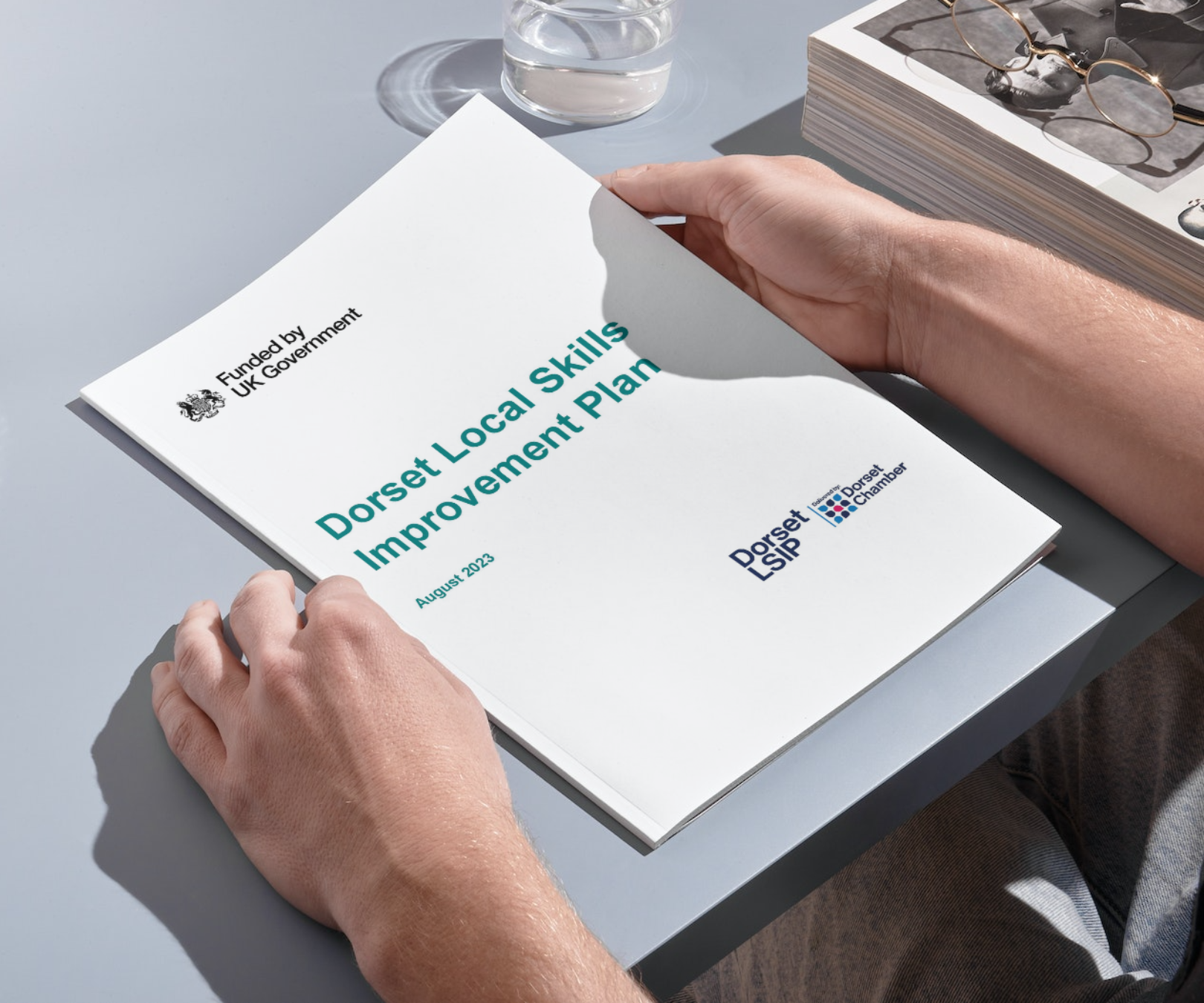
Final sign-off.
Finally, after a lot of hard work, the Secretary of State signed off the Dorset LSIP report in August 2023.
The success was down to great collaboration between the Dorset Chamber, its stakeholders, and The Study team.
When the research scope is big, you can’t go it alone. You need a team that goes beyond boundaries.
What did we learn?
Across the five sectors, we found:
- Employers value work readiness, motivation, and communication skills as much as traditional “technical skills.”
- Businesses want more government guidance and resources to reduce their carbon emissions for the net zero transition.
- Employers think holistically about employment questions, as skills development is often intimately linked with other challenges.
- Demand for digital skills across sectors, including using databases in healthcare, working with machines in agriculture, and programming languages in tech.
Within the five sectors, we found:
Health and Social Care.
- Upskilling can reduce the workload on senior staff, e.g., dispensary training for pharmacists and Advanced Nurse Practitioner courses for doctors.
- Staff transitioning from clinical to management roles need more non-clinical management training as there is little guidance available.
- People think employees should not only be able to teach technical skills but also show empathy, communicate, and have compassion.
Advanced Engineering and Manufacturing.
- Practical and design positions value a fundamental engineering mindset, which requires knowledge of working with materials and product production.
- Apprenticeships are highly regarded in this industry, with companies seeking specialist training from colleges outside their county if local courses are not available.
- Continuous technical change due to new machines and production techniques requires ongoing employee training to keep up.
Construction.
- Difficulty finding staff and a decline in new entrants to the sector have caused labor costs to increase without a corresponding increase in quality workmanship.
- Construction workers need to be able to read plans and work to higher tolerances as demand for higher-quality work increases.
- Building lower-carbon homes requires a holistic understanding of building principles and greater integration between trades.
- Larger companies are aware of the need to change building methods for net zero, but smaller employers show little awareness of modern construction methods.
Digital Tech and Creative.
- Employers highly value communication, teamwork, and stakeholder management skills, which are often lacking in new employees or need to be taught on the job.
- Data management requires a range of skills, such as statistical testing, data visualisation, data cleaning, and setup.
- There is a culture of self-teaching in the industry, and many employers are not aware of formal training options, leading employees to self-teach programming and other technical skills.
Agriculture, Agri-tech, and Aquaculture.
- All participants recognized the sector was changing, and skills needed to develop for farms to survive.
- Emphasis was placed on the fundamentals of land management and animal husbandry.
- Automation is a solution for labour shortages but requires skilled farm managers that can handle complex machines and farming systems.
What’s next?
Dorset Chamber is now progressing with phase two.
This phase begins with conducting a literature review of other LSIP data to identify patterns and trends.
The findings from the literature review will inform the themes that will be explored in focus groups with employers from the core sectors.
These focus groups are scheduled for November 2023 and will be facilitated by The Study.
The team is looking forward to continuing the project into 2024.


